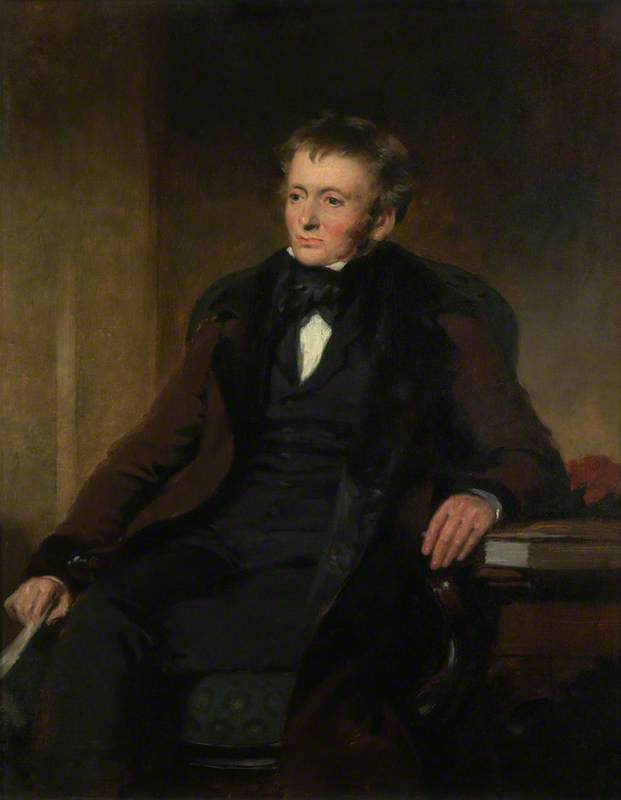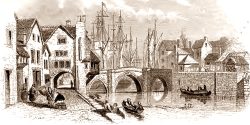
The following extracts recount how Thomas DeQuincy, a noted essayist and best known for his ‘Confessions of an English Opium Eater’, tracked down and found the poet Samuel Taylor Coleridge in Bridgwater, staying with John Chubb. This is taken from DeQuincy’s essay ‘Samuel Taylor Coleridge’ first published in Tait’s Magazine in 1834/5. The full account can be read here. In the Summer of 1807 DeQuincy heard that Coleridge was staying in Nether Stowey with Thomas Poole, and being not far away, decided to introduce himself. However, by the time he got to Stowey, Coleridge had already gone over to Bridgwater to see Jonathan Chubb. The description of finding Coleridge at a gateway in the town’s principle street would suggest Chubb’s main house fronting Fore Street, while the Inn may be the adjoining Castle Inn.
…happening to visit the Bristol Hotwells in the summer of 1807, I had the pleasure to hear that Coleridge was not only once more upon English ground, but within forty and odd miles of my own station. In that same hour I bent my way to the south; and, before evening, reaching a ferry on the river Bridgewater, at a village called, I think, Stogursey (i.e. Stoke de Courcy, by way of distinction from some other Stoke) [he actually means Combwich] , I crossed it, and a few miles farther attained my object — viz., the little town of Nether Stowey, amongst the Quantock Hills. Here I had been assured that I should find Mr. Coleridge, at the house of his old friend Mr. Poole. On presenting myself, however, to that gentleman, I found that Coleridge was absent at Lord Egmont’s, an elder brother (by the father’s side) of Mr. Perceval, the Prime Minister, assassinated five years later; and, as it wait doubtful whether he might not then be on the wing to another friend’s in the town of Bridgewater, I consented willingly, until his motions should be ascertained, to stay a day or two with this Mr. Poole.
Two or three days had slipped away in waiting for Coleridge’s re-appearance at Nether Stowey, when suddenly Lord Egmont called upon Mr. Poole, with a present for Coleridge: it was a canister of peculiarly fine snuff, which Coleridge now took profusely…
On this occasion we learned, for the first time, that Lord Egmont’s carriage had, some days before, conveyed Coleridge to Bridgewater, with a purpose of staying one single day at that place, and then returning to Mr. Poole’s. From the sort of laugh with which Lord Egmont taxed his own simplicity, in having confided at all in the stability of any Coleridgian plan, I now gathered that procrastination in excess was, or had become, a marking feature in Coleridge’s daily life. Nobody who knew him ever thought of depending on any appointment he might make : spite of his uniformly honourable intentions, nobody attached any weight to his assurances in re futura: those who asked him to dinner or any other party, as a matter of course, sent a carriage for him, and went personally or by proxy to fetch him; and, as to letters, unless the address were in some female hand that commanded his affectionate esteem, he tossed them all into one general dead-letter bureau, and rarely, I believe, opened them at all…
Lord Egmont’s information, and the knowledge now gained of Coleridge’s habits, making it very uncertain when I might see him in my present hospitable quarters, I immediately took my leave of Mr. Poole, and went over to Bridgewater. I had received directions for finding out the house where Coleridge was visiting; and, in riding down a main street of Bridgewater, I noticed a gateway corresponding to the description given me. Under this was standing, and gazing about him, a man whom I will describe. In height he might seem to be about five feet eight (he was, in reality, about an inch and a-half taller, but his figure was of an order which drowns the height) ; his person was broad and full, and tended even to corpulence; his complexion was fair, though not what painters technically style fair, because it was associated with black hair; his eyes were large, and soft in their expression; and it was from the peculiar appearance of haze or dreaminess which mixed with their light that I recognized my object. This was Coleridge. I examined him steadfastly for a minute or more; and it struck me that he saw neither myself nor any other object in the street. He was in a deep reverie; for I had dismounted, made two or three trifling arrangements at an inn-door, and advanced close to him, before he had apparently become conscious of my presence. The sound of my voice, announcing my own name, first awoke him; he started, and for a moment seemed at a loss to understand my purpose or his own situation; for he repeated rapidly a number of words which had no relation to either of us. There was no mauvaise honte in his manner, but simple perplexity, and an apparent difficulty in recovering his position amongst daylight realities. This little scene over, he received me with a kindness of manner so marked that it might be called gracious. The hospitable family with whom he was domesticated were distinguished for their amiable manners and enlightened understandings: they were descendants from Chubb, the philosophic writer, and bore the same name. For Coleridge they all testified deep affection and esteem— sentiments in which the whole town of Bridgewater seemed to share; for in the evening, when the heat of the day had declined, I walked out with him; and rarely, perhaps never, have I seen a person so much interrupted in one hour’s space as Coleridge, on this occasion, by the courteous attentions of young and old. All the people of station and weight in the place, and apparently all the ladies, were abroad to enjoy the lovely summer evening; and not a party passed without some mark of smiling recognition, and the majority stopping to make personal inquiries about his health, and to express their anxiety that he should make a lengthened stay amongst them. Certain I am, from the lively esteem expressed towards Coleridge at this time by the people of Bridgewater, that a very large subscription might, in that town, have been raised to support him amongst them, in the character of a lecturer, or philosophical professor.
Coleridge led me to a drawing-room, rang the bell for refreshments, and omitted no point of a courteous reception. He told me that there would be a very large dinner party on that day, which, perhaps, might be disagreeable to a perfect stranger; but, if not, he could assure me of a most hospitable welcome from the family. I was too anxious to see him under all aspects to think of declining this invitation. That point being settled, Coleridge, like some great river, the Orellana, or the St. Lawrence, that, having been checked and fretted by rocks or thwarting islands, suddenly recovers its volume of waters and its mighty music, swept at once, as if returning to his natural business, into a continuous strain of eloquent dissertation, certainly the most novel, the most finely illustrated, and traversing the most spacious fields of thought by transitions the most just and logical, that it was possible to conceive…
For about three hours he had continued to talk, and in the course of this performance he had delivered many most striking aphorisms, embalming more weight of truth, and separately more deserving to be themselves embalmed, than would easily be found in a month’s course of select reading. In the midst of our conversation, if that can be called conversation which I so seldom sought to interrupt, and which did not often leave openings for contribution, the door opened, and a lady entered. She was in person full and rather below the common height ; whilst her face showed to my eye some prettiness of rather a commonplace order. Coleridge paused upon her entrance ; his features, however, announced no particular complacency, and did not relax into a smile. In a frigid tone he said, whilst turning to me, “Mrs. Coleridge”; in some slight way he then presented me to her: I bowed; and the lady almost immediately retired. From this short but ungenial scene, I gathered, what I afterward learned redundantly, that Coleridge’s marriage had not been a very happy one…
At dinner, when a very numerous party had assembled, he knew that he was expected to talk, and exerted himself to meet the expectation. But he was evidently struggling with gloomy thoughts that prompted him to silence, and perhaps to solitude : lie talked with effort, and passively resigned himself to the repeated misrepresentations of several amongst his hearers. The subject chiefly discussed was Arthur Young, not for his Rural Economy, but for his Politics…
At night he entered into a spontaneous explanation of this unhappy overclouding of his life, on occasion of my saying accidentally that a toothache had obliged me to take a few drops of laudanum. At what time or on what motive he had commenced the use of opium, he did not say; but the peculiar emphasis of horror with which he warned me against forming a habit of the same kind impressed upon my mind a feeling that he never hoped to liberate himself from the bondage. My belief is that he never did. About ten o’clock at night I took leave of him; and, feeling that I could not easily go to sleep after the excitement of the day, and fresh from the sad spectacle of powers so majestic already besieged by decay, I determined to return to Bristol through the coolness of the night. The roads, though, in fact, a section of the great highway between seaports so turbulent as Bristol and Plymouth, were as quiet as gardenwalks. Once only I passed through the expiring fires of a village fair or wake: that interruption excepted, through the whole stretch of forty miles from Bridgewater to the Hotwells, I saw no living creature but a surly dog, who followed me for a mile along a park-wall, and a man, who was moving about in the half-way town of Cross. The turnpike-gates were all opened by a mechanical contrivance from a bedroom window; I seeme’d to myself in solitary possession of the whole sleeping country. The summer night was divinely calm; no sound, except once or twice the cry of a child as I was passing the windows of cottages, ever broke upon the utter silence; and all things conspired to throw back my thoughts upon the extraordinary man whom I had just quitted.
